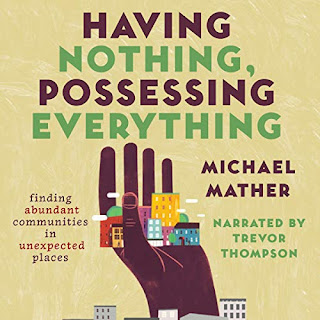Discover Assets in Your Neighborhood
Michael Mather, is the author of "Having Nothing, Possessing Everything” and an advocate for asset-based community development (ABCD).
Mather advocates for never doing something for someone in a community that they can do for themselves.
"If we begin looking for people's gifts rather than people's needs, then even better things than we thought possible might materialize," Mather, former pastor at Broadway United Methodist Church located in an urban, low-income neighborhood of Indianapolis.
If you want to improve a neighborhood, involve the people there.
"I began my ministry seeing scarcity, seeing only the things that seemed to be missing in the neighborhoods where I pastored. What I learned from those neighborhoods was how to see the abundance," said Mather.
The transformation began at the food pantry run at the church. "We stopped asking people about how poor they are and started asking about skills and interests instead," said Mather.
When a lady said she was a good cook, they hired her to cook for some events.
"In a few months, she had her own small business, and we supported her in getting started," said Mather. "At the food pantry, if we had asked her when she showed up, 'Tell us how poor you are,' we would've missed a business that made a real difference in this family’s life."
But the church did not stop there. They hired a young man in the community to The Roving Listener to visit with people in the neighborhood, needs, and community assets.
"We would try to find ways to bring people together who cared about the same thing. If we found people who loved trains, we'd get people together. If we found people who grew things, we got those people together," said Mather.
At the heart of asset-based community development is the gifts of the individual. There are three keystones to asset-based community development: gifts of the individual, official and unofficial associations, and institutions.
According to Mather, they also worked out five rules of implementation.
The first rule is never to do something for someone if they can do it themselves.
The second is finding others' gifts, talents, capacities, passions, and dreams and finding a place for them in the community's life.
The third rule is don't give poor people services, give poor people income, because what poor means is people don't have money.
The fourth rule: if people are bent on providing services rather than income, see that it comes in a way that gives people a choice, agency, or power.
The fifth rule is to practice hospitality.
Mather says it is important to listen first
and discover what is already happening to make asset-based community
development successful in your neighborhood.
###





Comments
Post a Comment